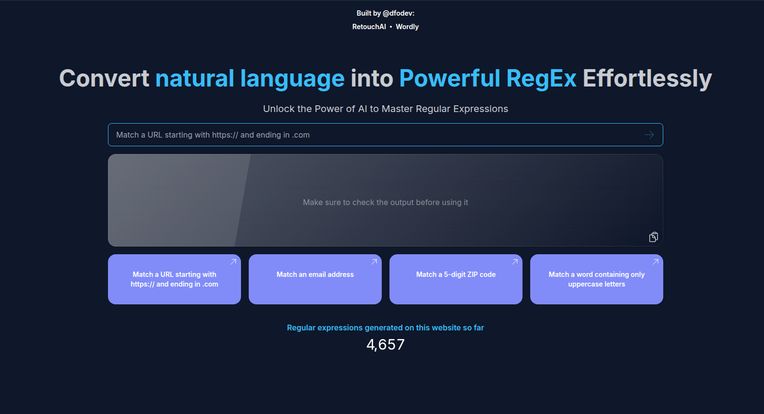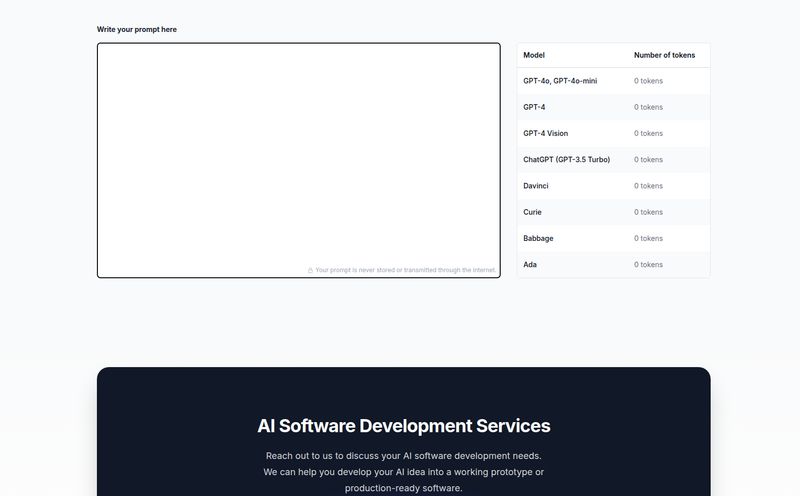Regular expressions. For many of us in the SEO and marketing world, the term itself is enough to cause a mild panic attack. It’s the digital equivalent of assembling IKEA furniture with instructions written in ancient Aramaic. You know it’s powerful, you know it can do amazing things, but you’d rather do just about anything else than actually try to write one from scratch.
I’ve spent more hours than I care to admit staring at a Google Analytics filter field, my cursor blinking mockingly, as I tried to cobble together a string of characters that looked more like a cat walked across my keyboard than a functional command. I've broken website reporting, filtered out ALL traffic (whoops), and generally made a mess of things on my quest to master RegEx. It's a rite of passage, I suppose.
But recently, I stumbled upon a tool that felt like a cheat code. It's called RegexBot, and it claims to convert plain, simple English into powerful RegEx. Effortlessly. My inner skeptic, honed by years of over-hyped tech, immediately perked up. Could it really be that simple? An AI RegEx generator that's also... free? I had to find out.
So, What is This RegexBot Thing Anyway?
At its core, RegexBot is exactly what it says on the tin: a free AI tool that builds regular expressions for you. You don't need to know the difference between a `` and a `+` or what the heck a `(?:)` is for. You just type what you want to do in plain English. For example, you could type “find all email addresses from gmail.com” and, in theory, it spits out the perfect RegEx pattern to do just that.
It's built by a developer who goes by @dfodev, and the interface is refreshingly minimalist. There are no bells and whistles, no distracting pop-ups, no mandatory sign-up to harvest your email. It's just a clean, dark-mode page with an input box. It feels less like a corporate product and more like a genuinely useful utility built by someone who understands the pain.

Visit RegexBot
Putting the AI to the Test: My First Run
Okay, time to kick the tires. The homepage gives you a few simple examples, like matching an email address or a 5-digit ZIP code. Cute. But I work in SEO. My needs are often a bit more... specific. A common task for me is digging through Google Search Console data to isolate certain types of queries. So, I decided to give it a classic SEO challenge.
The Challenge: Isolating Question-Based Queries
I wanted to find all the search queries that start with words like “what”, “how”, “why”, or “can”. This is super useful for identifying informational intent and content gaps.
I typed into the RegexBot box: "A phrase that starts with 'what', 'how', 'why', or 'can'"
I hit enter and held my breath. A second later, this appeared in the output box:
^(what|how|why|can)\b.
I blinked. That... looks right. Actually, that's pretty much exactly what I would have written. The `^` anchors it to the start of the string. The `(what|how|why|can)` is a perfect OR group. The `\b` is a word boundary, a nice touch to prevent it from matching words like "canal". And the `.` matches anything after it. I copied it, pasted it into my data tool, and it worked flawlessly.
I was impressed. Genuinely. This little free tool just saved me five minutes of syntax checking and testing. That might not sound like much, but those five-minute tasks add up over a week.
Why an AI RegEx Builder is a Game Changer for SEOs
This is where my mind really started racing. The applications for a tool like this in my daily workflow are huge. It's not about being lazy; it's about being efficient. It’s about removing a technical barrier to get to the strategic insights faster.
Better Google Analytics and GA4 Filtering
Imagine needing to create a view filter or a report that excludes traffic from your own company's various office IPs. Or maybe you want to isolate traffic to a specific subdirectory of your site, like `/blog/`, but not `/blog/authors/`. Typing "match URLs containing /blog/ but not /blog/authors/" into RegexBot is infinitely more intuitive than wrestling with negative lookaheads. Trust me.
Smarter Screaming Frog Crawls
If you use tools like Screaming Frog SEO Spider, you know the power of custom extraction and filtering. Want to scrape all the phone numbers off a website? Or find every page that mentions a specific competitor's brand name? Instead of digging through RegEx cheat sheets, you can just ask the bot. This turns a complex technical task into a simple query and for a lot of people, that's a huge win.
Diving Deeper into Log File Analysis
For the technical SEOs out there, log file analysis is a goldmine. But the files are massive and unwieldy. Using RegEx to filter for specific user-agents (like finding all hits from Googlebot vs Bingbot) or to isolate certain request types is standard practice. RegexBot could be a fantastic starting point for building those complex queries, getting you 80% of the way there in 10% of the time.
The Good, The Bad, and The AI
No tool is perfect, especially not a free one powered by the beautiful, chaotic magic of AI. So lets get into the nitty-gritty. What do I love, and what should you be careful about?
What I Absolutely Love
First and foremost, it's free. In a world of endless SaaS subscriptions, a genuinely useful tool that doesn't ask for a credit card is a rare gem. It lowers the barrier to entry for one of the most powerful skills in data analysis. It makes RegEx more accessible, and that's a fantastic thing for our industry.
I also appreciate its speed and simplicity. It’s a single-task tool that does its job well. It's a scalpel, not a Swiss Army knife. It's like having a coding buddy on call who is a regex wizard, ready to help without any judgment for you not knowing the arcane syntax.
A Necessary Word of Caution
The tool itself gives you a very important piece of advice right on the homepage:
"Make sure to check the output before using it"
And I can't echo this enough. Always, always, always test the RegEx it gives you. Use a tool like Regex101 or the built-in testing features in whatever platform you’re using (like Google Analytics' filter verification).
AI is only as good as the input it receives. If your English prompt is vague or ambiguous, you're going to get a wonky result. For instance, I asked it to “find URLs with numbers in them” and it gave me a simple `\d+`. This works, but it doesn't account for the context of a URL. A more experienced human might ask clarifying questions. The AI just gives you the most literal interpretation. It’s not a mind reader, it’s a translator. Garbage in, slightly-more-structured-but-still-garbage out.
Is RegexBot Really and Truely Free?
Yep. As of right now, it seems to be a passion project. There's no pricing page, no premium tier, no hidden costs. It's just there to be used. How long that will last, who knows? But for now, it's an incredible resource for the community, and I'm certainly going to make the most of it.
Frequently Asked Questions about RegexBot
What exactly is RegEx in simple terms?
Think of it as a hyper-specific version of the 'Find' feature in a document. Instead of just finding a simple word, RegEx lets you define a pattern to find. For example, you can create a pattern that finds any sequence of three numbers, or any word that starts with 'A' and ends with 's'. It's a language for describing and matching text patterns.
Is it safe to put sensitive information into RegexBot?
As a general rule, I would advise against pasting any sensitive or proprietary data into any online tool, this one included. While the tool is likely safe, it's just good practice. Use it to generate the pattern, then apply that pattern to your data on your own local machine or secure platform.
Can RegexBot handle extremely complicated requests?
My gut tells me it's best for low-to-medium complexity tasks. It's brilliant for getting you started or for handling common patterns. For something incredibly nuanced with multiple nested conditions and lookarounds, you might find it struggles. But it can still give you a solid foundation to build upon, which is better than starting from a blank page.
Who is the ideal user for this AI tool?
Honestly, almost anyone who works with data. SEOs, PPC specialists, data analysts, developers who need a quick pattern, students learning to code, and even writers trying to do complex find-and-replace operations in their manuscripts. If you've ever been frustrated by RegEx, this tool is for you.
How do I test the RegEx it generates?
My go-to is a website called Regex101. You can paste the RegEx pattern from RegexBot into the top bar, and then paste some sample text you want to test it against in the box below. It will highlight the matches in real-time and even provide a detailed explanation of what each part of the RegEx pattern does. It's the perfect companion tool.
Are there any good alternatives to RegexBot?
Yes, the world of AI code generation is exploding. Tools like GitHub Copilot and other general-purpose LLMs can also generate RegEx. However, the beauty of RegexBot is its specialization and simplicity. It's built for one job and it does it without the overhead of a larger, more complex platform.
My Final Thoughts on RegexBot
So, is RegexBot a magical solution that means you never have to learn RegEx again? No, not quite. I dont think it replaces the deep understanding that comes from practice. But that's not the point.
RegexBot is an incredible assistant. It's a bridge. It makes a powerful, intimidating technology approachable and fast. It can turn a 20-minute-headache into a 2-minute-task. For me, it's already earned a permanent spot in my browser's bookmarks bar. It's a brilliant, free, and genuinely useful tool for anyone who needs to wrangle text and data. And in this line of work, that’s just about everyone.
Reference and Sources
- RegexBot Tool: https://regex.rodeo/ (Note: based on the creator's projects, this seems to be the official URL)
- Creator's Twitter/X Profile: https://twitter.com/dfodev
- RegEx Testing Tool: https://regex101.com/
- Google's Guide to RegEx in Analytics: Google Analytics RegEx Help



